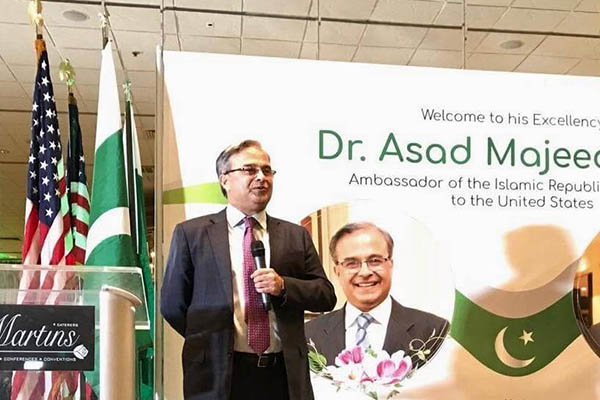
File photo of Ambassador Asad Majeed Khan
In letter to U.S. congressman, Islamabad’s envoy to Washington reiterates that Pakistan has no favorites in Afghanistan
Blaming Pakistan’s “military strategy” for the Taliban’s defeat of the Afghan National Army ignores the U.S. government’s own assessments about the issues that had rendered the force an ineffective counter to the insurgents, Islamabad’s envoy to Washington, Asad Majeed Khan, has said.
“As the Special Inspector General for Afghanistan Reconstruction had been reporting (until it was barred from doing so by the Pentagon), the Afghan government had been steadily losing territory to the Taliban for many years,” read a letter addressed to U.S. Congressman Michael G. Waltz.
Last week, the Republican member of the U.S. House of Representatives from Florida wrote a letter to U.S. President Joe Biden urging him to cut off all aid to Pakistan and consider sanctioning it “unless they change course and make greater efforts to prevent the Taliban from using their border region to regroup between firefights.” He also accused Pakistan of being “complicit” with the Taliban and “choosing not to” work with the Afghan National Security Forces.
In his response, which he also shared on Twitter, Ambassador Khan said that while the final collapse of the Afghan government was shocking, it was not surprising. “As someone who has served his country in uniform and with distinction, you know that demoralized soldiers do not fight for a corrupt, kleptocratic leadership that will bolt at the first hint of trouble.” He stressed that the U.S. government’s own assessment about low morale, desertions and “ghost soldiers” had made clear some of the factors leading to the defeat of the 300,000-strong Afghan National Defense and Security Forces.
It was “unfortunate that your letter mischaracterized Pakistan’s role in Afghanistan,” he wrote. Noting that Pakistan and the U.S. were working together to achieve an inclusive political settlement in Afghanistan, he said both countries shared a “fundamental interest” in preventing the war-torn state from ever again becoming a sanctuary for terrorist groups.
Stressing that Pakistan had repeatedly clarified that it had no favorites in Afghanistan, and still supported the formation of a broad-based Afghan government representing the country’s ethnic diversity, he said Islamabad had also joined the U.S., China and Russia in “explicitly opposing any efforts to impose a government by force in Kabul.”
Instead of being Pakistan’s fault, read the letter, the swift collapse of the West-backed Afghan government proved “the futility of investing more effort and money into finding a military solution to a political problem.”
The ambassador also summarized Pakistan’s efforts to aid in the evacuation from Kabul of foreign nationals, and Afghans with valid documentation. “Our doors and borders are open to the Afghan people who still look to Pakistan as their first port of call in moments of distress—notwithstanding the erstwhile Afghan regime’s deliberate campaign to poison relations between our two countries,” he said.
